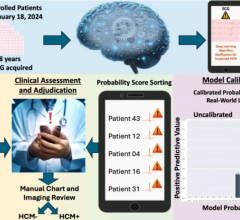
September 4, 2018 — Prevencio Inc. announced new data demonstrating its HART PAD test accurately diagnoses peripheral artery disease (PAD) in diabetes mellitus (DM) patients, a patient population in which PAD prevalence has traditionally been difficult to assess. Researchers believe these findings, presented at the 2018 European Society of Cardiology (ESC) Congress, Aug. 25-28 in Munich, Germany, could lead to early identification of PAD and improve patient clinical outcomes, as well as prevent patients without PAD from undergoing unnecessary, expensive and invasive tests.
The study is follow-on to data presented at the American Diabetes Association (ADA) 2018 Scientific Sessions in June demonstrating Prevencio’s HART CAD and HART CVE tests accurately diagnose coronary artery disease (CAD) and predict the risk for major adverse cardiac events (MACE) in DM patients. Similar to CAD, PAD is commonly due to atherosclerosis, a plaque buildup in the arteries which restricts blood flow.
In this study, researchers assessed the company’s artificial intelligence (AI)-driven HART PAD diagnostic test on patients enrolled in Massachusetts General Hospital’s (MGH) Catheter Sampled Blood Archive in Cardiovascular Disease (CASABLANCA) study. The HART PAD test algorithmically assesses six biomarkers linked to atherosclerosis, as well as a patient’s history of hypertension. In patients with DM, the HART PAD panel had excellent performance for diagnosis of PAD. Using a five-point score, a score of 1 had a 100 percent negative predictive value (NPV) and a score of 5 had a 95 percent positive predictive value (PPV). Additionally, the HART PAD panel was highly accurate in predicting the need for revascularization in patients with PAD. These results were comparable to those patients without DM.
Principal investigator James L. Januzzi, M.D., practicing cardiologist at MGH and professor of medicine at Harvard Medical School, said, “The HART PAD test may allow for the diagnosis and treatment of many more patients with currently undetected PAD. In the clinical setting, these findings could assist physicians to identify peripheral artery disease earlier, provide guideline-recommended care and monitor at-risk patients for vascular complications. We believe HART tests could also play an important role in identifying high-risk patients for enrollment in clinical trials, thereby saving time and lowering overall trial costs.”
PAD affects more than 202 million people worldwide and is often underdiagnosed and undertreated until the disease has reached advanced stages. Patients with DM are at substantial risk of developing PAD. Patients with PAD have increased risk of CAD, heart attack or stroke and, if left untreated, PAD can lead to foot or leg amputation.
For more information: www.prevenciomed.com


 September 24, 2025
September 24, 2025 









